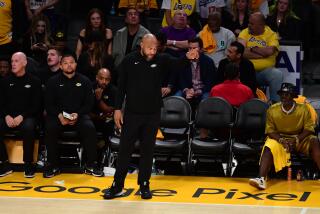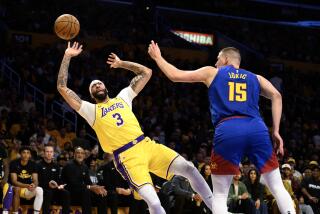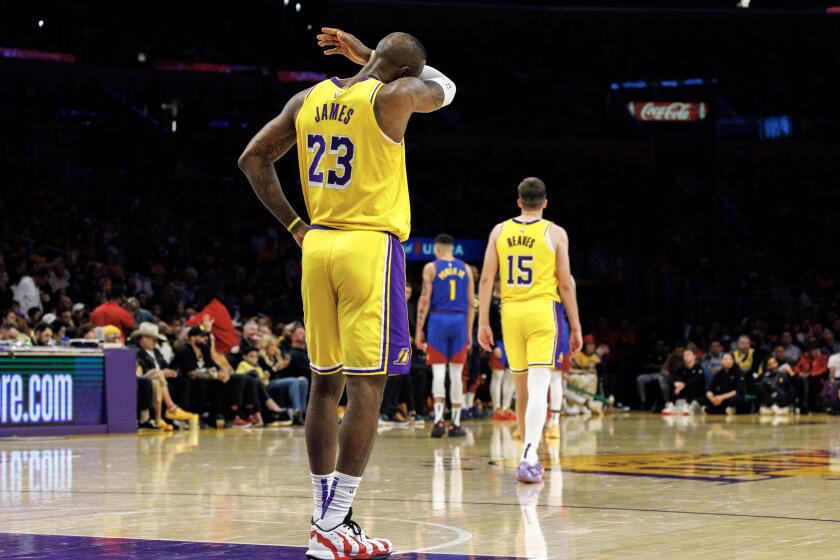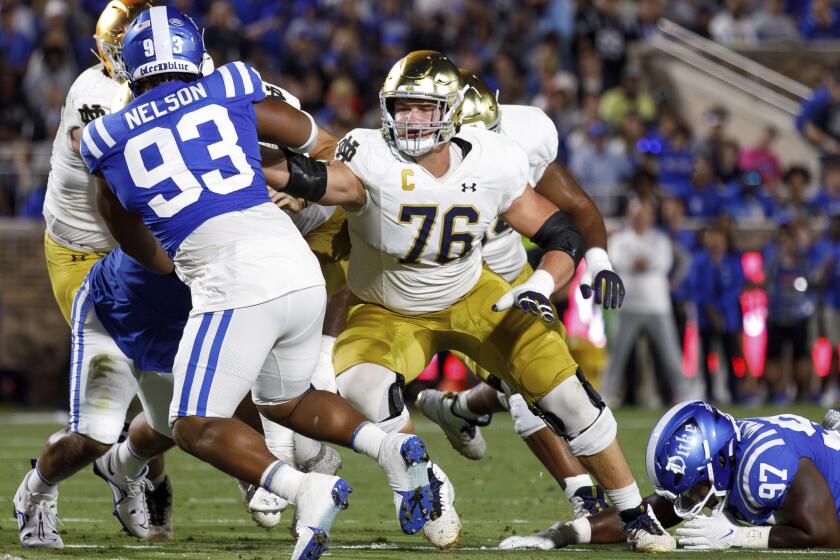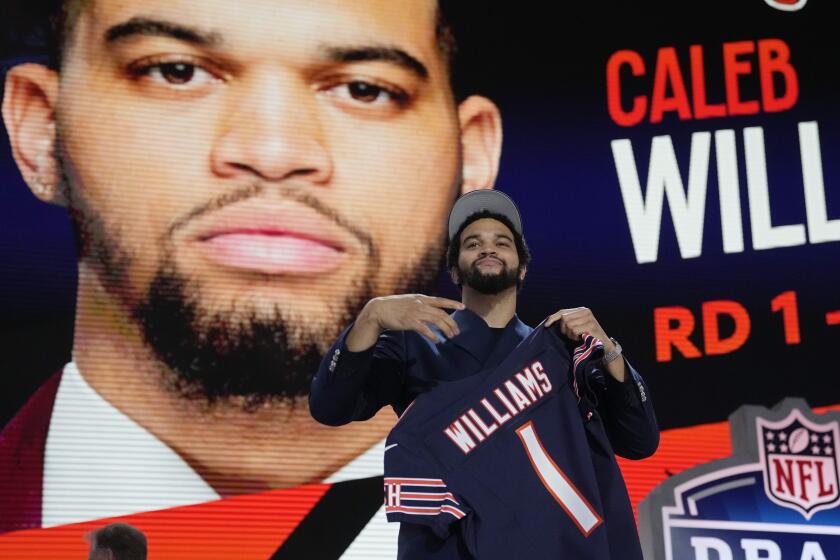NCAA May Call Delay of Games
Declaring, “we have to be respectful of our men and women in uniform,” NCAA President Myles Brand said Monday he is prepared to postpone men’s and women’s basketball tournament games if war with Iraq begins this week.
Brand said the NCAA is checking the availability of arenas and hotels for the days after first- and second-round games are scheduled to be completed. That would give the officials more flexibility as they determine possible postponements.
“We don’t know when [war] will start,” Brand said. “On the other hand, I think we have to be very careful not to let Saddam Hussein control our lives. We have to balance those.”
Brand’s sentiments seem to be resonating across the sporting landscape.
NASCAR executives are considering shortening races because of climbing gasoline prices, Martha Burk says she will tone down the planned lightheartedness of her Masters protest, and Major League Baseball’s opening-day game in Tokyo is iffy.
Insisting his primary consideration is the safety of athletes and fans, Brand said the NCAA has maintained contact with the Homeland Security Department and security officials as it prepares contingency plans. He declined to give details, saying information would be announced as events proceed.
“We’re doing a lot of planning, but we don’t know what direction it will go,” Brand said.
The NCAA men’s tournament first round begins Thursday, the morning after the 48-hour deadline President Bush set Monday night for Hussein to leave Iraq or face war. The women’s tournament begins Saturday.
Bruce Woodbury, director of community relations at Utah and media coordinator for the men’s basketball West Regional in Salt Lake City, said, “As far as I know we’re going to be playing our games on Thursday and our school will be playing its game on Friday.” Woodbury attended a meeting with the West Regional staff Monday, and said there was no discussion about changing game days.
Brand said postponements of other NCAA championships, such as those in men’s and women’s swimming and diving and men’s and women’s ice hockey, would also be considered. Any decisions would be made in consultation with federal authorities and security officials. Brand’s office would make the final call.
“We have to arrive at a position that makes the most sense for the NCAA,” he said. “But we don’t want a tyrant to run our lives.”
The implications of war have generated meetings among the nation’s sports leaders, most of whom say their reactions hinge on uncertainties.
“All we can say at this moment is that the commissioner is in contact with Washington and he will be guided by world events,” Major League Baseball spokesman Rich Levin said of the opening-day game between the Oakland A’s and Seattle Mariners on March 25 in Tokyo.
That was a familiar theme.
The NBA is expected to soon increase security at arenas and for its teams should a war in Iraq begin within the next few days. It was not immediately clear if the breakout of war would force the postponement of games, however.
Locally, the Clippers play host to the Denver Nuggets on Wednesday and the Lakers face the Kings at Sacramento on Thursday.
It was status quo for both teams when they played each other Monday at Staples Center, with the customary post-Sept. 11 security present as fans, players, coaches, arena workers and reporters entered the arena.
“A lot of the security measures that other buildings may be upgrading to we’ve had in place since the terrorist attacks,” said Michael Roth, Staples Center director of communications. “That includes the walk-through metal detectors, the size limitations on bags fans bring into the building and the X-raying of deliveries, including packages and mail. Since the last time the country’s terrorist rating was raised, we’ve heightened measures. A lot of it is visual, but there also is a lot behind the scenes.
“It’s all about making the fans feel safe. There are many other technological security measures behind the scenes that the fans are not aware of.”
Added Tim Frank, the NBA’s senior director of basketball communications: “I don’t think we’re holding to any exact protocol. For now, we’re moving forward as if it were business as usual. The temperature of the American people will be a key factor.”
The most pressing complications involve television coverage.
CBS, preparing a backup plan to move regularly scheduled NCAA men’s basketball tournament games to cable television if war news takes precedence, is continuing discussions with ESPN. Before Brand revealed the possible delay of games, Sean McManus, CBS Sports president, said negotiations were nearing completion to switch first-round games to ESPN or ESPN2, if necessary.
An ESPN spokesman said details had yet to be worked out.
During the first two days of the tournament, ESPN2 has more room than ESPN. ESPN is committed to an NHL game Thursday at 5 p.m. and an NBA doubleheader Friday at 5 p.m.
Beyond Friday, the situation becomes more complicated. ESPN and ESPN2 are committed to televise all 63 games of the NCAA women’s tournament, and both networks’ coverage of the first round on Saturday and Sunday begins at 8 a.m. If second-round games of the men’s tournament have to be moved from CBS, they will probably be carried on TNN or another CBS sister cable channel, perhaps Nickelodeon or TV Land. TNN and CBS are both owned by Viacom.
NBA and NHL telecasts on ABC will probably be moved to ESPN if war news preempts games. Fox Sports Net would carry NASCAR races.
What could change everything is a tragedy closer to home.
“Obviously, an attack on the U.S. changes everything, but in this type of war, there’s an obligation to continue our events” said boxing promoter Bob Arum, who has a fight card scheduled Saturday at Mandalay Bay Resort and Casino in Las Vegas. “There might be an adverse effect on our live gate, but I would assume many people would be staying at home, glued to their television. It’s only natural for them to want some entertainment at night, so they can turn their channels for that.”
War will also shape sporting behavior.
In considering a repeat of a step it took in the energy crisis in the 1970s, NASCAR leaders discussed shortening races if gas prices continue to soar.
“We’re cognizant of the fact that fuel prices affect our fans,” NASCAR spokesman Jim Hunter said. “The amount of fuel we use in a race is a drop in the bucket compared to what gasoline is available, and we’ve developed catch cans and filter systems that won’t allow for spills during pit stop disconnects.
“But during the Carter administration, there was this attitude from some in the public, ‘Here I am sitting in a line for gas, and those guys are wasting that fuel.’ So we talked about that [Monday] and discussed the possibility of doing it again.”
Burk, leader of the National Council of Women’s Organizations, said the anticipated somber tone would affect how she orchestrates her planned April 12 protest of all-male Augusta National Golf Club during the third round of the Masters.
“If there was no war, I wanted [the protest] to be a lighthearted thing,” Burk said. “In light of war, our tenor would change. As long as the tournament is played, we will protest, but we don’t want to do anything that would seem to trivialize war or be unseemly or make light of what the troops are doing.”
Burk refused to provide details of her intentions, except to say that protesters would poke fun at Augusta National club chairman Hootie Johnson.
The Rev. Jesse Jackson, the civil rights leader who was planning to join Burk at Augusta, has told those closest to him the war could lead him to a peacekeeping endeavor during Masters week.
The issue of international travel has resulted in varied reactions.
The $16.25-million Dubai World Cup horse race in the United Arab Emirates remains scheduled for March 29, but FIFA, soccer’s world governing body, has canceled the March 25-April 16 world youth championships in the United Arab Emirates.
NFL spokesman Greg Aiello said there were no restrictions yet established for the scheduled NFL Europe season, to be played April 5-June 14. Similarly, Women’s Tennis Assn. tour spokesman Jim Fuhse said that no foreign players had withdrawn from events in the U.S. and that no U.S. players have said they will skip foreign events, which begin next month, because of security concerns.
“It’s not something we’re thinking about at this point,” Fuhse said. “It’s way too early, with way not enough information.”
USA Swimming officials will conduct a teleconference Thursday with leaders of the Australian swimming team to discuss their planned April 6 “Duel in the Pool” in Indianapolis.
“Obviously, things will be changing in the coming days, so Australia can’t say yes or no yet,” said Mary Wagner, a spokeswoman for USA Swimming. “Are we going to war? What’s going to happen? Assuming there are no disasters here, they’ll be here.”
The U.S. men’s water polo team boarded a flight from Los Angeles International Airport to France on Monday. The team will participate in a six-country international tournament beginning Thursday in Nice.
“Sport shouldn’t reflect what happens between governments,” U.S. Coach Ratko Rudic said.
The U.S. Olympic Committee is instructing leaders of its sports’ national governing bodies to consult the USOC security division, which maintains daily contact with the State Department for travel advisories, before leaving the country.
“There will be some instances where we’ll stress our athletes use good judgment and not wear their Team USA gear out in public,” USOC spokesman Darryl Seiber said. “In some parts of the world, it’s wise to maintain a less than obvious profile.”
*
The Associated Press and staff writers Larry Stewart and Elliott Teaford contributed to this report.
More to Read
Get our high school sports newsletter
Prep Rally is devoted to the SoCal high school sports experience, bringing you scores, stories and a behind-the-scenes look at what makes prep sports so popular.
You may occasionally receive promotional content from the Los Angeles Times.
